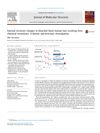 37 citations,
January 2013 in “Postepy Dermatologii I Alergologii”
37 citations,
January 2013 in “Postepy Dermatologii I Alergologii” Isotretinoin effectively reduces acne but causes dry skin, higher skin pH, more redness, and hair loss.
 1 citations,
March 2021 in “Phytomedicine plus”
1 citations,
March 2021 in “Phytomedicine plus” Cernitin™, a pollen extract, was found to significantly reduce pain and inflammation in rats with chronic prostatitis, suggesting it could be a useful alternative to certain anti-inflammatory drugs.
 7 citations,
March 2019 in “Journal of The European Academy of Dermatology and Venereology”
7 citations,
March 2019 in “Journal of The European Academy of Dermatology and Venereology” A man developed a skin reaction from metronidazole, which improved after stopping the drug and starting steroids.
 August 2023 in “Asian journal of pharmaceutical and clinical research”
August 2023 in “Asian journal of pharmaceutical and clinical research” Intense Pulsed Light is an effective and safe hair removal method for people with excessive hair growth.
 60 citations,
February 2010 in “Gynecological Endocrinology”
60 citations,
February 2010 in “Gynecological Endocrinology” Metformin combined with lifestyle changes improves insulin resistance and reduces testosterone levels in women with PCOS more than lifestyle changes alone.
 1 citations,
July 2020 in “Dermatology”
1 citations,
July 2020 in “Dermatology” Photobiomodulation helps reduce pain, lessen inflammation, heal wounds, and can be used in skin treatments. It also boosts hair growth in women with hair loss and may help fight microbes and prevent respiratory issues in COVID-19.
 17 citations,
June 2012 in “European journal of medicinal chemistry”
17 citations,
June 2012 in “European journal of medicinal chemistry” New steroid compounds effectively inhibit 5α-reductase and may treat hair loss.
 January 2016 in “Archivio italiano di urologia, andrologia”
January 2016 in “Archivio italiano di urologia, andrologia” The document concludes that the risk of sexual side effects from 5-alpha-reductase inhibitors is low and often temporary, but more research is needed on potential permanent effects.
 32 citations,
May 2013 in “The Journal of Urology”
32 citations,
May 2013 in “The Journal of Urology” Using finasteride or dutasteride does not increase the risk of male breast cancer.
 25 citations,
June 2013 in “Obesity Reviews”
25 citations,
June 2013 in “Obesity Reviews” Mesotherapy might help reduce fat in specific areas for those close to their ideal weight, but more research and care are needed to ensure safety.
 19 citations,
April 2020 in “Dermatologic Therapy”
19 citations,
April 2020 in “Dermatologic Therapy” Dutasteride works better than finasteride for hair loss, with both being safe to use.
 16 citations,
January 2010 in “Drug Metabolism and Pharmacokinetics”
16 citations,
January 2010 in “Drug Metabolism and Pharmacokinetics” Finasteride's effect on hair loss and prostate enlargement depends on its binding to an enzyme, with maximum impact at 0.2 mg dose.
 31 citations,
January 2017 in “Advances in Experimental Medicine and Biology”
31 citations,
January 2017 in “Advances in Experimental Medicine and Biology” Low testosterone and 5α-reductase inhibitors can harm men's metabolic and sexual health; testosterone therapy may help, but discussing 5α-RIs' side effects is important.
 7 citations,
January 2018 in “Reproduction”
7 citations,
January 2018 in “Reproduction” Inhibiting 5α-reductase increases progesterone levels in late pregnant mares.
 7 citations,
May 2015 in “General and Comparative Endocrinology”
7 citations,
May 2015 in “General and Comparative Endocrinology” Finasteride negatively affects fish reproduction and gonadal development.
 6 citations,
August 1996 in “The Journal of Clinical Endocrinology and Metabolism”
6 citations,
August 1996 in “The Journal of Clinical Endocrinology and Metabolism” MK-386 and finasteride together effectively reduce DHT levels, potentially treating acne and male pattern baldness.
 5 citations,
January 2020 in “Skin Research and Technology”
5 citations,
January 2020 in “Skin Research and Technology” Minoxidil 5% works better than 2% for hair growth in male-patterned hair loss.
 4 citations,
April 1955 in “Textile Research Journal”
4 citations,
April 1955 in “Textile Research Journal” The effectiveness of reducing agents on hair fibers depends on their electrode potentials.
 November 2023 in “ACS Omega”
November 2023 in “ACS Omega” New liposome treatment successfully delivers CRISPR to deactivate a key enzyme in androgen-related disorders.
8 citations,
April 2021 in “Journal of Clinical Investigation” Finasteride reduces opioid use and withdrawal symptoms in animals.
 11 citations,
February 2008 in “British journal of nursing”
11 citations,
February 2008 in “British journal of nursing” Idiopathic hirsutism causes excessive hair growth in women, can be treated with medication and hair removal, but cannot be fully reversed.
 5 citations,
January 2001 in “Advances in protein chemistry”
5 citations,
January 2001 in “Advances in protein chemistry” 5α-reductase inhibitors help treat disorders caused by DHT and have potential for future therapies.
 3 citations,
September 2016 in “Natural Product Communications”
3 citations,
September 2016 in “Natural Product Communications” Germacrene analogs, especially 8-Hydroxy germacrene B, are more effective than germacrone at blocking a hormone-related enzyme and could help treat hair loss.
Avicennia Marina extract and avicequinone C can reduce hair loss hormone production and increase hair growth factors, suggesting they could be used to treat androgenic alopecia.
 4 citations,
August 2014 in “Journal of molecular structure”
4 citations,
August 2014 in “Journal of molecular structure” Chemical treatments on bleached black hair change its internal structure by breaking and reforming bonds, and treatments with hydrolyzed eggwhite protein help repair it.
 24 citations,
May 2015 in “Schizophrenia Research”
24 citations,
May 2015 in “Schizophrenia Research” A drug improved schizophrenia-like symptoms in stressed rats by changing brain steroid levels.
 17 citations,
December 2015 in “BMC Complementary and Alternative Medicine”
17 citations,
December 2015 in “BMC Complementary and Alternative Medicine” A new plant extract from Avicennia marina could potentially be used to treat common hair loss.
 73 citations,
January 1997 in “British Journal of Ophthalmology”
73 citations,
January 1997 in “British Journal of Ophthalmology” The coronal approach is effective and safe for reducing eye bulging in Graves' eye disease.
 3 citations,
January 2017 in “Journal of cosmetology & trichology”
3 citations,
January 2017 in “Journal of cosmetology & trichology” The nutritional supplement improved hair quality and reduced hair loss.
 2 citations,
January 2011 in “Clinical medicine insights”
2 citations,
January 2011 in “Clinical medicine insights” Dutasteride is effective for treating prostate enlargement and reducing related surgery risk, but is not approved for preventing prostate cancer.




























